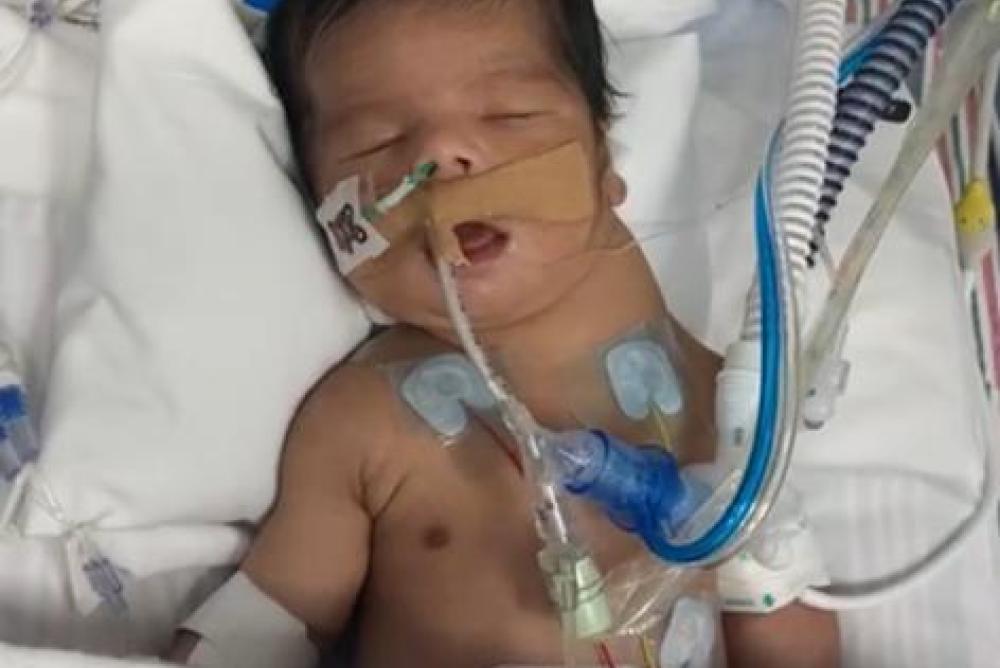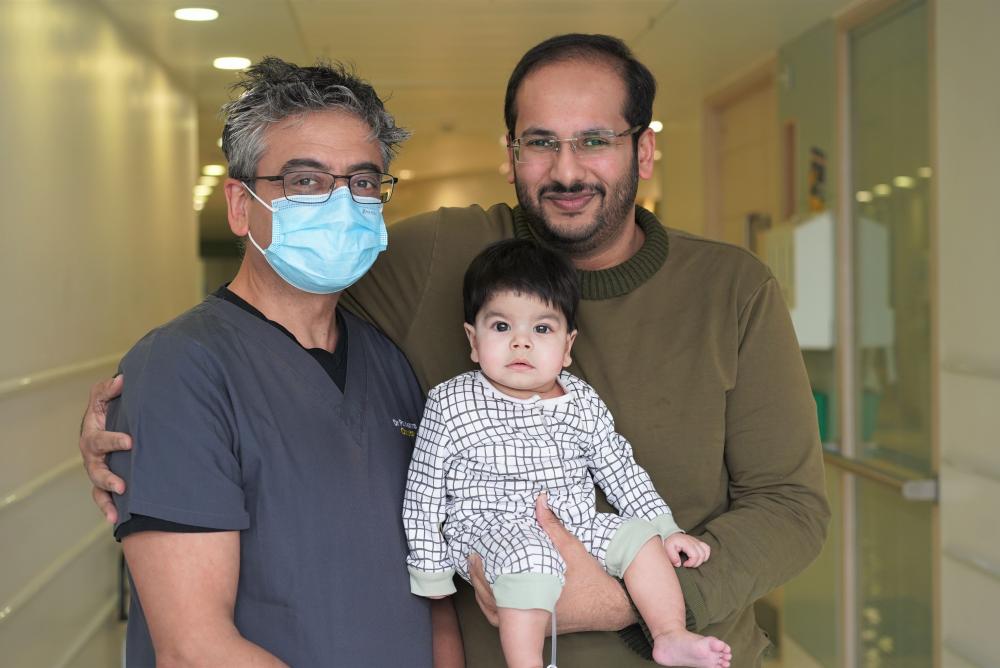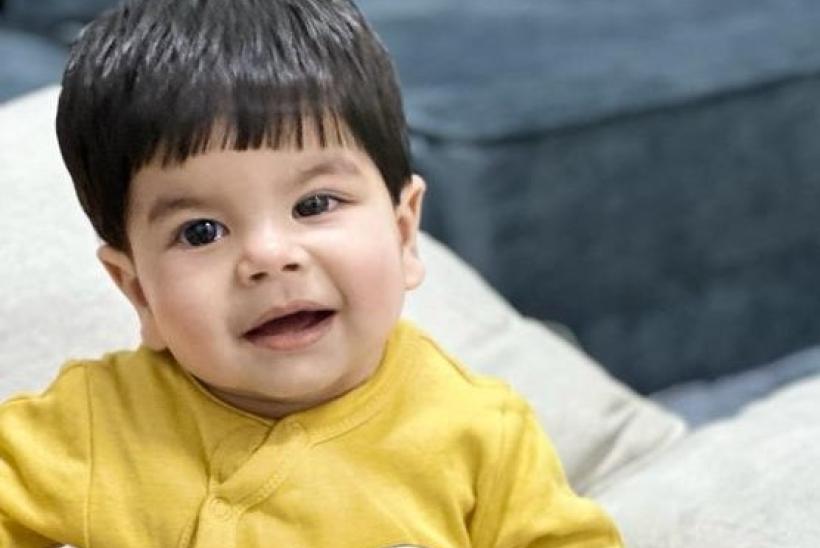Baby Omar's Triumph over Rare Complications
Discovering a Rare Condition
Baby Omar was born with a severe congenital malformation in his chest and neck called cystic hygroma, a rare condition that occurs due to abnormal development of the lymphatic system. The mass was discovered during a routine ultrasound while Omar's mother was still pregnant. As the pregnancy progressed, the malformation grew and started affecting Omar's lung function. Doctors suggested performing a specialised delivery procedure called EXIT (ex utero intrapartum treatment) at a Hospital in the United Arab Emirates (UAE) to address the airway compression.
"This was an extremely rare case," explained Mohammed, Omar's father. "There have only been a few surgeries of its kind in our country in recent years. The procedure was quite complex, involving the insertion of a tube into the baby's mouth while he was still inside the mother's womb."
After Omar's birth, the cystic hygroma was confirmed. Unfortunately, the initial surgery to remove a portion of the malformation resulted in severe complications. Omar experienced loss of control in his left eye, damage to his left vocal cord, and left lung paralysis. This resulted in him being unable to breathe for himself and requiring a ventilator.

Seeking Expertise at Great Ormond Street Hospital
Recognising the need for specialised care, the doctors recommended seeking a second opinion from one of the leading specialised centres in the world. Great Ormond Street Hospital (GOSH) was chosen to assist the family with this.
"The doctors advised us to trust GOSH, as it is one of the world's premier hospitals for paediatric care," recalled Mohammed. "When we arrived, we were welcomed very warmly."

A Multidisciplinary Approach: Collaborative Efforts to Restore Omar's Health
Under the expert care of Dr. Paul Aurora at GOSH, Omar's treatment involved a multi-disciplinary approach with a team of paediatric specialists. These included thoracic surgery, ENT surgery, abdominal surgery, interventional radiology, ophthalmology, and cardiology. “The complications after his surgery back in his home country meant that he was stuck on a ventilator. He was referred to us to get him off the ventilator and to make a long-term plan” Dr Aurora explained. The complexity of Omar's condition was further highlighted by the rare occurrence of Rowland Payne syndrome, which caused significant nerve damage. “This is a situation where the nerves supplying the vocal cords, diaphragm, and eye are all affected. We sometimes see this in adults who have neck tumours, but it is exceptionally rare in children, and it is many years since we last saw this complication even at Great Ormond Street.” Dr Aurora added.
Over the following weeks and months, Omar underwent multiple surgeries. Two major procedures were performed to repair his left diaphragm. These surgeries aimed to restore proper lung function and improve Omar's breathing. Additionally, a second major surgery was conducted to address injury to his stomach, which had resulted in feeding difficulties and milk was sometimes going into his lungs.
During Omar's recovery, he received dedicated care from the intensive care team, ward nurses and multidisciplinary teams at GOSH. Despite facing various challenges, his progress was remarkable. Omar’s father, Mohammed said, “If you saw Omar six months before and if you see him now, you will see the difference” Omar no longer relies on a ventilator and only requires a small amount of extra oxygen at night and when he’s sleeping. He had started consuming solid foods, although he still relies on a feeding tube for milk.
We are delighted with how well Omar has done; he was very fragile when he first arrived with us. He is a lot stronger now.
Dr Paul Aurora
Dr. Aurora and his colleagues advised against further surgery to remove the remaining malformations, as the potential risks outweighed the benefits at that stage. Instead, close monitoring and regular detailed scans would be conducted to ensure Omar's condition remained stable. GOSH would continue to collaborate with medical colleagues in the UAE for ongoing monitoring.
Tapping into a supportive community
The journey at GOSH goes beyond medical procedures, it required faith, strength, and positivity from Omar’s family especially his dad. Mohammed formed strong bonds with other fathers in the ward, transforming the family room into a supportive hub for shared experiences. They discussed various aspects, including hospital matters, accommodations, food, travel, and insurance. It was a unique situation to have a ward filled with fathers solely taking care of their children, fostering a close-knit group. “there's a lot of dads here alone with their children, so that was very interesting. I was told this is the first time it has happened, having mostly dads on the ward with their children” “We were a gang of dads; it was really cool.”
Although Mohammed's family had to return home due to school and job commitments, they maintained regular hours-long video calls, ensuring constant communication. Despite the physical separation, Mohammed felt GOSH staff provided a warm and supportive environment. Translators were readily available, cultural, and religious beliefs were respected, and he liked the social space created for international patients. “They made a special leaving party for us and another child because they both came together. They invited the all the kids and family from the ward, it was lovely.”
Expressing his gratitude, Mohammed emphasised, "when we arrived at GOSH, we were warmly welcomed. GOSH is a highly specialised centre that has treated numerous cases from around the world. They provided invaluable support, and we are immensely grateful for finding them."


